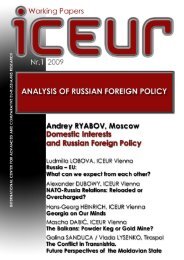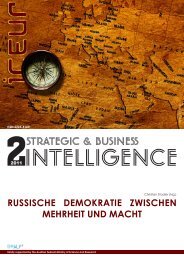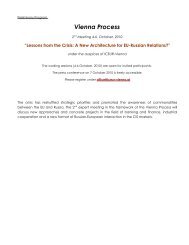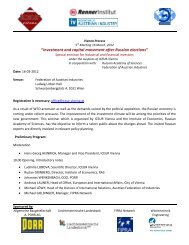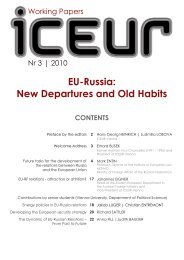Address - International Center for Advanced and Comparative EU ...
Address - International Center for Advanced and Comparative EU ...
Address - International Center for Advanced and Comparative EU ...
Create successful ePaper yourself
Turn your PDF publications into a flip-book with our unique Google optimized e-Paper software.
Alex<strong>and</strong>er DYNKIN<br />
Global Turmoil: Challenges <strong>for</strong> Russia<br />
activity is crucial <strong>for</strong> regional employment. Import tariffs (automobiles, steel, tubes) were increased (albeit<br />
not substantially). As <strong>for</strong> stimulation of domestic dem<strong>and</strong>, it is rather limited (some schemes were adopted<br />
<strong>for</strong> refinancing mortgage <strong>and</strong> domestically produced automobile credit) because of the danger of inflation<br />
<strong>and</strong> import growth.<br />
The emphasis in stimulating business activity will be on public dem<strong>and</strong> through financing large - scale<br />
projects. So this year we began tintensive construction in the region of Sochi, where the Winter Olympic<br />
Games will take place in 2014, as well as in Vladivostok <strong>for</strong> the 2012 APEC summit.<br />
Up to now, social protection schemes have been comparatively modest, but are expected to be increased in<br />
line withchanges in unemployment.<br />
Meanwhile, the anti-crisis measures adopted in Russia were quite expensive. At the end of 2009, the costs of<br />
planned measures were equal to 15% of the GNP. Over the next one to two years, their overall cost may<br />
double.<br />
The large volume of anti-crisis measures is explained by the fact that the crisis has aggravated Russia's acute<br />
longst<strong>and</strong>ing structural problems. Besides, modernization, which has begun in many sectors (food<br />
processing or metallurgy, <strong>for</strong> example), has not yet been completed. Anti-inflationary credit <strong>and</strong> monetary<br />
policy in Russia, as I have already said, substantially differed from the world trend <strong>and</strong> only since April<br />
started the turn in the correct direction.<br />
Apparently, Russia needs a dose of - what in economic literature is called - supply side economy. Its st<strong>and</strong>ard<br />
levers are: 1) cheap credits; 2) low taxes. This last point is most important. The stimulating of supply requires<br />
changes not only in our monetary policy, but our budget policy as well. Otherwise, the actual depression in<br />
Russia cannot trans<strong>for</strong>m into recovery <strong>and</strong> post crisis growth as in other BRIC states, but into long term<br />
creeping stagnation.<br />
Russian - South Korean Relations: Main Trends <strong>and</strong> Prospects<br />
To prevent such negative trends, potentially fraught with Russia´s removal from the leading group of<br />
emerging economies <strong>and</strong> its relegation to the peripheral group, it is important to use the experience of our<br />
partners as well as technological <strong>and</strong> economic cooperation. The Republic of Korea is quite a good example<br />
of such a perspective partnership in bi-lateral <strong>and</strong> multi–lateral relations (both regional <strong>and</strong> global).<br />
There are several aspects which influence Russia's policy towards the Korean peninsula: security issues,<br />
nuclear weapon proliferation, the political activity of the great powers, <strong>and</strong> access to the markets. Political<br />
relations between Russia <strong>and</strong> the Republic of Korea improved significantly, especially since the beginning<br />
of the 2000s. Moscow`s <strong>and</strong> Seoul`s views on key issues of political <strong>and</strong> security stability on the Korean<br />
Peninsula <strong>and</strong> in North East Asia coincide or are very close. Both sides oppose the North Korean nuclear <strong>and</strong><br />
missile program <strong>and</strong> support six party talks. At the same time Russia is ready to support inter-Korean<br />
cooperation.<br />
During the 1990s economic ties between Russia <strong>and</strong> the ROK were unstable, while bilateral trade fluctuated<br />
around a point of $3 bln. Nevertheless, joint ef<strong>for</strong>ts <strong>and</strong> improvement of domestic economies in Russia <strong>and</strong><br />
the ROK were the main reasons <strong>for</strong> positive trends in economic relations between the two countries after<br />
1998, when both Russia <strong>and</strong> the ROK suffered under the crisis. As a result, the debt problem has been<br />
successfully resolved, bilateral trade reached $18 billion in 2008 or increased six times since 2000.<br />
However, average trade with Russia makes up only 1.2-1.5% of South Korea's <strong>for</strong>eign trade, <strong>and</strong> trade with<br />
South Korea makes up 2.2%-2.5% of Russia's <strong>for</strong>eign trade.<br />
Total South Korean investments in Russia in 2008 reached $1.2 bln (70% were carried out during 2006-<br />
2008), while envisaged investments are estimated at $3 bln. The insignificant scale of Russian investment in<br />
the ROK (estimated at $20-30 mln) is an important symbol of the misbalanced economic relations between<br />
the two countries. It is evidence of the low level of Russian business involvement in North East Asian<br />
economies as well as in regional economic cooperation.<br />
Regional co-operation mainly reflects the difference in involvement of European Russia <strong>and</strong> the Russian Far<br />
East in economic exchange with the ROK. South Korean car producers, leading electronics companies <strong>and</strong><br />
some others firms pay more attention to the European part of Russia. The role of South Korean direct<br />
12 IC<strong>EU</strong>R-Vienna Working Papers 2|2009



